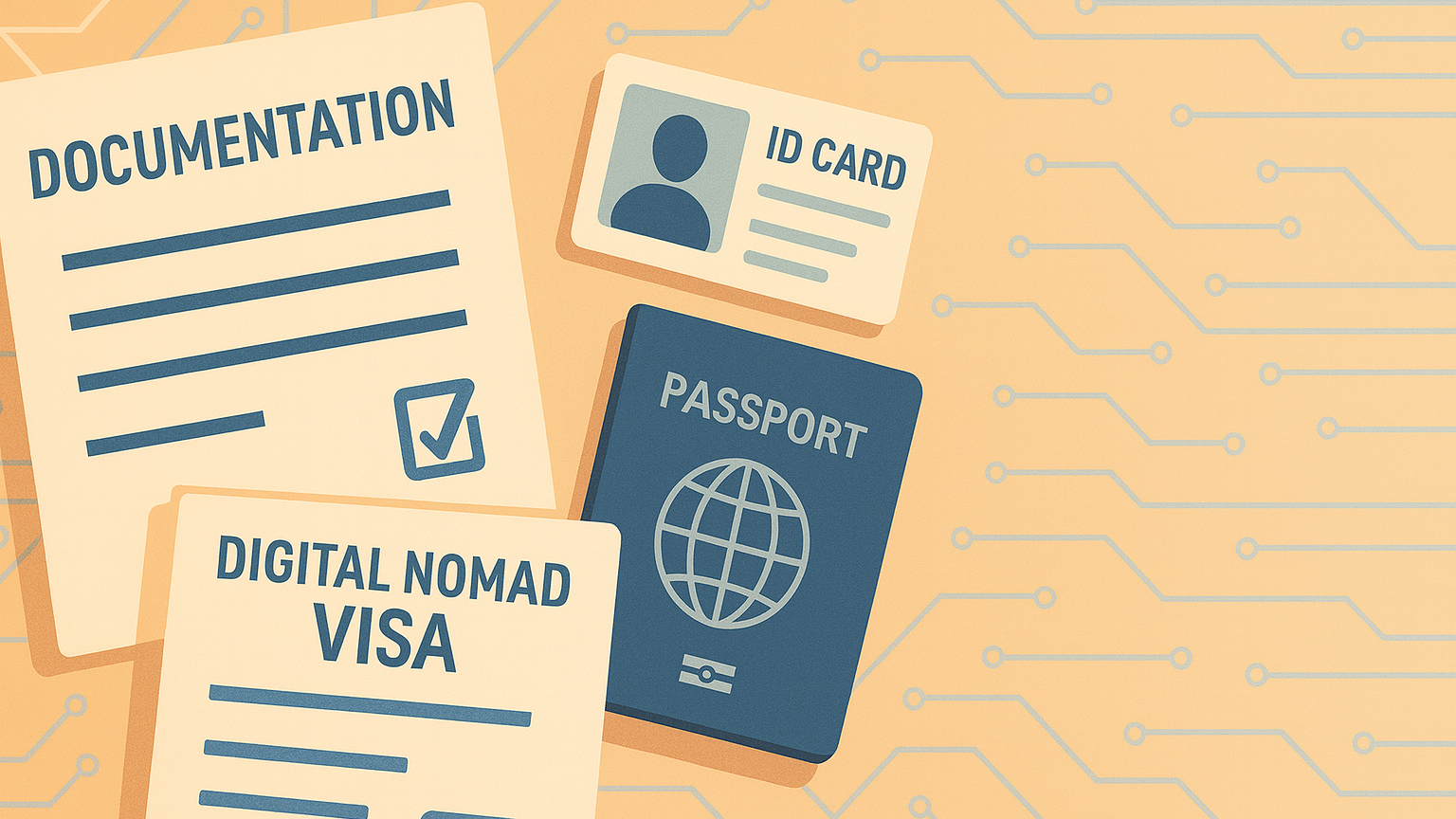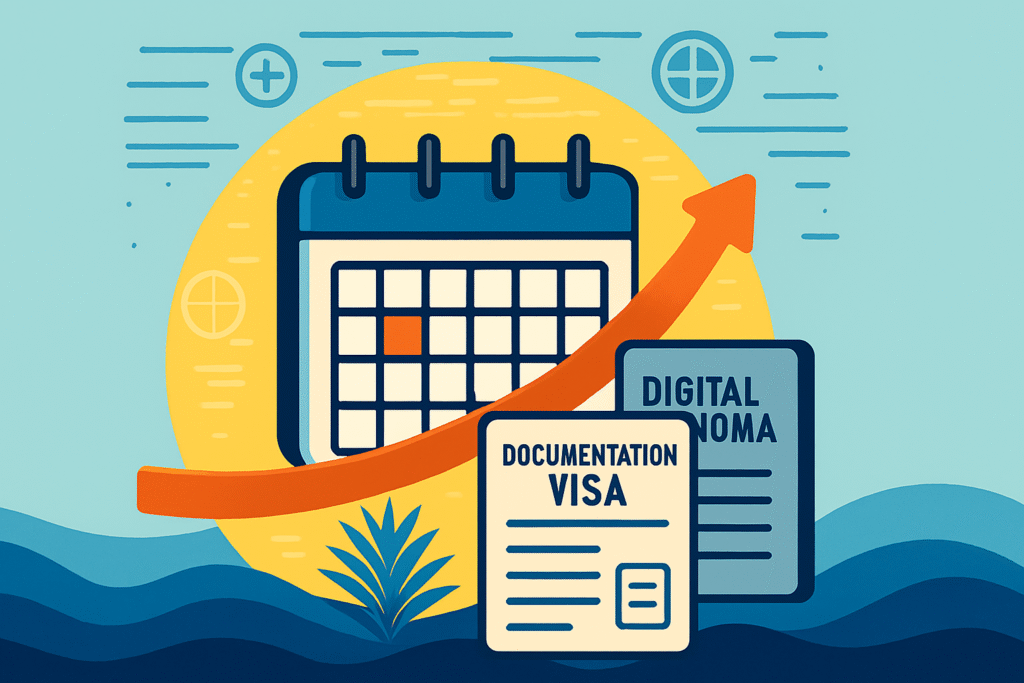Digital nomad life usually revolves around flexibility and adventure, but long stays in a foreign country are limited by the validity of your visa. In Brazil, the digital nomad visa (VITEM XIV) allows remote workers to live in the country for up to one year while working for a foreign employer. After the first year, a renewal is essential to maintain lawful status. This article explains the timeline and documentation required for renewal and provides practical tips for North American and European nomads looking to extend their Brazilian adventure.
Overview of Brazil’s Digital Nomad Visa and Why Renewal Matters
Brazil introduced the digital nomad visa in 2022 to attract remote workers who do not work for Brazilian employers. According to Brazil’s Normative Resolution No. 45/2021 (CNIG), the visa grants an initial residence authorization of up to one year. The applicant must demonstrate the ability to work remotely using telecommunications technologies, supply a contract or proof of relationship with a foreign employer and show proof of income of at least US$ 1,500 (≈ R$ 8,155 or € 1,288) per month or savings of US$ 18,000 (≈ R$ 97,861 or € 15,455). Holders of the visa may not undertake employment for Brazilian companies.
The initial one‑year period is generous compared with many tourist visas, but digital nomads who fall in love with Brazil often want to stay longer. That’s where renewal comes in. Article 6 of the same resolution states that the residence period may be renewed for an equal period. Essentially, you can apply for another one‑year authorization by providing fresh documentation such as updated criminal record certificates and proof of foreign income. Renewal is not automatic; it requires planning, proper documentation and adherence to the prescribed timeline.
Understanding the Renewal Timeline
When should you think about renewal? As a rule, your digital nomad visa is valid for one year from the date the Federal Police registers your residence permit. The timeline to renew is therefore anchored to the expiry date on your CRNM (Registro Nacional Migratório card). The CNIG resolution does not set a strict deadline, but it does clarify that the renewed authorization will also last for one year. To avoid overstaying, most lawyers recommend submitting the documentation at least 30–60 days before your permit expires. This gives the Federal Police time to process your request and reduces the risk of falling into irregular status.
The renewal request should be filed through the MigranteWeb system run by Brazil’s Ministry of Justice. You fill out a form, upload the required documentation, pay the fee and schedule an appointment at the Federal Police. After you attend your appointment, your renewal application will be reviewed, and once approved the Federal Police will issue a new CRNM valid for another year. If you plan to leave Brazil temporarily while your application is pending, make sure you obtain a proper travel authorization; otherwise, you may inadvertently cancel your process.
Documentation Required for Renewal
Article 6 of CNIG Resolution No. 45/2021 lists the documentation needed to renew your digital nomad visa. You must submit:
- Updated CRNM copy: A photocopy of your current CRNM (residence card) showing the expiration date.
- Application form and processing fee receipt: The MigranteWeb system generates the form and boleto for payment. Although the resolution does not set the fee, consular posts indicate that new applications cost around € 120 (≈ R$ 759; ≈ US$ 140). Renewal fees are similar, but always verify with the Federal Police.
- Declaration of continued remote work: A signed statement affirming that you still work remotely for a foreign employer and that your services are delivered via information technologies.
- Employment or service contract: A contract or letter from your foreign employer or clients proving ongoing work and pay in foreign currency.
- Proof of income: Evidence that your monthly income remains at least US$ 1,500 (≈ R$ 8,155; ≈ € 1,288) or that you still maintain bank funds of US$ 18,000 (≈ R$ 97,861; ≈ € 15,455). This can be pay slips, bank statements or a notarized declaration from your employer.
- Recent criminal record certificates: New certificates from the police authorities of every country where you lived for the past year. They must be apostilled or legalized and translated into Portuguese by a sworn translator.
- Declaration of no criminal history: A sworn statement affirming you have no criminal record.
- Travel and health insurance: Comprehensive medical insurance valid in Brazil for the renewed period.
- Additional documents: The Federal Police may request updated proof of address, marriage or birth certificates and evidence of tax compliance.
Make sure all documentation is digitized and uploaded to the MigranteWeb portal before your appointment. On the day of your Federal Police visit, bring the originals and copies, as officers will compare them with the digital files.

Costs Associated with Renewal
Although the CNIG resolution does not publish a standard renewal fee, consular information provides an estimate. The Embassy of Brazil in Helsinki states that the consular fee for a digital nomad visa is € 120. Converting this to other currencies at August 2025 exchange rates (1 EUR = R$ 6.3321 and 1 USD = R$ 5.4367), € 120 equates to R$ 759.85 or US$ 139.76. The Federal Police uses similar fee tables for residence permit renewals. You should budget an additional R$ 757–R$ 1,000 (~US$ 139–$183; € 120–€ 160) to cover translation and notarization of foreign documentation as well as postage.
Beyond the renewal fee, consider Brazil’s cost of living. According to Numbeo, estimated monthly costs for a single person in Rio de Janeiro are R$ 3,258 (≈ US$ 599; ≈ € 515) excluding rentnumbeo.com. A family of four spends around R$ 11,401 (≈ US$ 2,101; ≈ € 1,807)numbeo.com. Prices vary by city; São Paulo tends to be more expensive, while smaller towns may be cheaper. For budgeting, factor in rent (R$ 1,500–R$ 4,500 per month depending on location), coworking memberships (R$ 300–R$ 600), health insurance and travel costs. Having savings above the required US$ 18,000 bank threshold provides financial security and proves financial solvency during your renewal.
Living in Brazil Long‑Term: Climate and Comfort
One reason digital nomads renew their visas is Brazil’s attractive climate. Rio de Janeiro experiences warm weather year‑round. Climate averages from timeanddate.com show that summer months (January–February) have average highs around 31 °C (88 °F) and lows near 24 °C (75 °F). Winter months (June–August) are mild with highs around 25 °C (77 °F) and lows of 19 °C (66 °F). Brazil’s vast territory means climates vary: the northeast offers hot, dry weather; the south can be cool in winter, and highland cities like Curitiba may see temperatures near 15 °C (59 °F).
Distances are also vast: traveling from Rio de Janeiro to São Paulo is about 430 km (≈ 267 mi) by road, while flying from Rio to Recife is over 1,850 km (≈ 1,150 mi). Domestic flights are affordable (R$ 500–R$ 900 per leg), and long‑distance buses cost less but take more time. Understanding these distances helps you plan trips around your renewal appointments.
For comfort, look for apartments with air conditioning (essential in summer), a dedicated workspace and good internet speeds. Fiber‑optic internet (200–400 Mbps) is available in major cities and costs around R$ 150 (≈ US$ 28; ≈ € 24) per month. Coworking spaces such as WeWork, Impact Hub and local offices exist in most large cities and provide networking opportunities.

Tax Considerations and Legal Responsibilities
Renewing your digital nomad visa also requires understanding Brazil’s tax rules. If you stay in Brazil for 183 days (consecutive or not) within a 12‑month period, you may become a tax resident and be subject to Brazilian income tax. Brazil uses a progressive rate ranging from 7.5% to 27.5% on worldwide income. However, you can avoid double taxation through tax treaties with countries like Canada, the United States and many European nations. Registering for a CPF (Brazilian tax identification number) is recommended—even consulates encourage obtaining one before arrival—because you’ll need it for renting property, opening bank accounts and signing contracts. Consult a tax professional familiar with both your home country and Brazilian law to structure your finances effectively.
Also note that Brazilian law prohibits foreigners from working for Brazilian employers without a proper work visa. You must continue to receive payments from foreign clients or companies to maintain eligibility. Keep bank statements in foreign currency, and do not invoice Brazilian entities on your digital nomad status. Failure to comply could jeopardize your renewal and lead to fines or deportation.
Health Insurance and Safety
One of the documentation requirements is proof of health insurance covering the full duration of your stay. While Brazil offers a public healthcare system (SUS), it is often overcrowded; private insurance ensures access to better facilities and is mandatory for visa holders. Many international insurers provide plans that cover long‑term stays abroad. Policies typically cost US$ 50–150 per month depending on age and coverage, and some accept payment in euros.
Safety is another concern. Brazil’s major cities have pockets of crime, so choose neighborhoods carefully. Areas like Leblon and Ipanema in Rio, Jardins and Vila Madalena in São Paulo and Lagoa da Conceição in Florianópolis tend to be safe and popular among expats. Always be aware of your surroundings, especially when using expensive electronics in public.
Family Members and Dependents
Many nomads travel with spouses or children. Currently, the digital nomad visa does not have a separate dependent category, but family members can apply for other visas (such as family reunion or student visas) or accompany the main applicant as tourists and later convert to a residence permit. Each person must meet their own documentation requirements. When applying for renewal, include copies of marriage certificates or birth certificates (apostilled and translated) to demonstrate familial relationships.
If your child attends school in Brazil, a student visa may be needed. Check the Federal Police and Ministry of Justice websites for the latest rules, as immigration policies evolve.
Steps to Successfully Renew Your Digital Nomad Visa
To ensure a smooth renewal process, follow this checklist:
- Mark your timeline: Track the expiry date of your CRNM and set reminders at least 90, 60 and 30 days before. Start collecting documentation early.
- Gather updated documents: Obtain new criminal record certificates from every country you lived in during the past year, have them apostilled/legalized and translated. Secure updated employment contracts and proof of income.
- Prepare translations: Engage a certified translator for any document not in Portuguese, English or Spanish. Brazilian authorities require sworn translations.
- Register in MigranteWeb: Create an account on MigranteWeb (Ministry of Justice) and submit your renewal application. Upload high‑quality scans of your documentation and pay the fee.
- Schedule Federal Police appointment: After submission, schedule a meeting at the Federal Police office in your city. Bring all originals and copies.
- Obtain your renewed CRNM: Once approved, collect your new CRNM. Check that the validity dates are correct and store the card securely.
- Maintain compliance: Continue paying taxes, maintain health insurance and keep your remote work arrangement. Keep digital copies of all documentation for future reference.

Frequently Asked Questions
Can I leave Brazil while my renewal is being processed?
Yes, you can travel, but you should request a travel authorization from the Federal Police before leaving. Traveling without authorization may be considered abandonment of your application.
How many times can I renew the digital nomad visa?
The resolution currently allows renewal for equal periods. Some sources interpret this as indefinite one‑year extensions as long as you continue to meet the requirements. However, migration policies can change, so confirm with the Federal Police each time.
What happens if my passport expires during my stay?
You must keep a passport valid for at least six months beyond your intended stay. If your passport expires, renew it at your home country’s consulate in Brazil and update the Federal Police.
Does renewal reset my tax residency clock?
No, the 183‑day rule is cumulative. Renewing your visa does not reset the tax residency calculation. After 183 days in Brazil, you may still be considered a tax resident, even if your visa status changes.
Do I need to maintain my foreign employment contract?
Yes. Your digital nomad visa depends on your continued employment with a foreign company or clients. If your contract ends, you must secure a new arrangement before applying for renewal.
Conclusion
Brazil’s digital nomad visa offers remote workers an opportunity to immerse themselves in a vibrant culture while maintaining their careers. The renewal process extends this adventure, but it requires careful planning, adherence to the timeline and meticulous preparation of documentation. By understanding the legal framework—particularly the CNIG Resolution No. 45/2021—and budgeting for fees, translations and living costs, nomads from Europe, Canada and the United States can enjoy long‑term stays in Brazil.
Remember that immigration rules evolve. Always verify the latest requirements with the Brazilian Federal Police or consulate before applying for renewal. With proper planning, the digital nomad visa can be your ticket to multiple years of sunshine, samba and productivity in one of the world’s most diverse countries.
References
- CNIG Resolution No. 45/2021 (Articles 4–6) – sets out documents for the digital nomad residence permit and states that the initial residence is one year; defines proof of remote work and income requirements and explains that the residence period may be renewed for an equal period upon submission of updated documents: portaldeimigracao.mj.gov.br.
- Embassy of Brazil in Helsinki – Digital Nomad Visa (VITEM XIV) – provides consular fee information (about € 120) and outlines processing timelines, registration with the Federal Police within 90 days and the importance of obtaining a CPF: gov.br
- Consulate‑General of Brazil in Porto – Visto Temporário XIV – lists required documents such as a valid passport, photo, apostilled birth certificate, criminal record certificate, declaration of remote work capability, employment contract and proof of monthly income of US$ 1,500 or bank funds of US$ 18,000:
- Numbeo Cost‑of‑Living Data (August 2025) – provides estimated monthly expenses for a single person (R$ 3,258) and a family of four (R$ 11,401) in Rio de Janeiro and sample prices for food and services: numbeo.com.
- Timeanddate.com Climate Averages for Rio de Janeiro (1992–2021) – indicates typical temperatures with summer highs around 31 °C (88 °F) and winter highs around 25 °C (77 °F): timeanddate.com.






